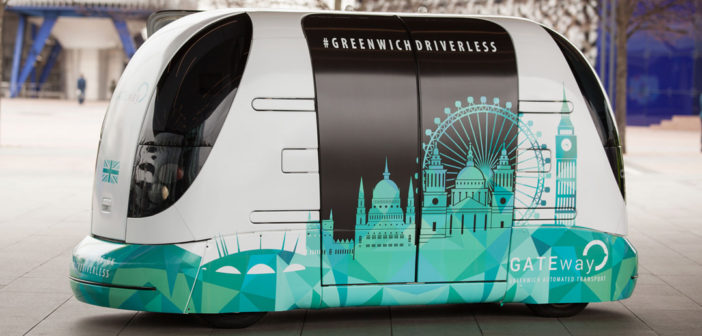Autonomous shuttle in Greenwich, London, UK to run in mixed environment with pedestrians and cyclists
The GATEway Project begun its research into public acceptance of, and attitudes towards, driverless vehicles in Greenwich, London last week on 5 April. Online consultation expert, Commonplace, gathered official feedback via an interactive map from members of the public who rode in the vehicles and those who observed them, about what this step towards the future of transport means.
The ongoing trials, which will see an autonomous vehicle driving in a complex urban environment, is not about robotising existing forms of transport, such as the car, but is examining ways to optimise mobility for the urban environment using new modes of transport enabled by automation.
Ahead of the vehicle launch, Commonplace had collected data on people’s views about the use of autonomous vehicles, with 78% seeing them as a very positive opportunity for Greenwich. This data has helped to identify locations where local people think that autonomous vehicles could solve problems, and places where there is greater anxiety about safety or accessibility.
Amongst others in the project consortium, the information collected by Commonplace is being used by the Royal Borough of Greenwich to support development of urban strategies that include autonomous vehicles.
In the latest phase of the GATEway Project (Greenwich Automated Transport Environment) a prototype shuttle will begin driverless navigation of a 2km route around the Greenwich Peninsula, using advanced sensors to detect and avoid obstacles whilst carrying members of the public participating in the research study.
The GATEway Project is a world leading research programme, led by TRL and funded by government and industry. It aims to demonstrate the use of automated vehicles for ‘last mile’ mobility, seamlessly connecting existing transport hubs with residential and commercial areas using a zero emission, low noise, on-demand transport system. Commonplace’s public findings along with further trial insights will guide the wider roll out of automated vehicle technology in all forms of surface transport, including cars, lorries and buses.
Mike Saunders, CEO at Commonplace, said: “Our immersive online platform engages people as they experience the vehicles. Gathering data in this innovative way mirrors the ground-breaking technology being trialled. Those riding in the driverless vehicles can leave feedback from their phone via three simple questions. In addition, local people who see the shuttle will be invited to ‘rate my driving’, which creates a sentiment map measuring public interactions with the vehicle, which is also an important aspect of the trial.”
Uniquely, the focus of the study is not the technology but how it functions alongside people in a natural environment. This first trial will explore people’s pre-conceptions of driverless vehicles and barriers to acceptance through detailed interviews with participants before and after they ride in the shuttle.
The project will not only see London and the UK emerge as a world leader in automated technology, but provide valuable sociological insight into what is expected to be the most profound change in mobility since the invention of the internal combustion engine.
The prototype shuttle, dubbed ‘Harry’ (in honour of navigation visionary John Harrison), underwent rigorous safety tests to ensure its sophisticated sensors were reading the dynamic environment correctly.
Professor Nick Reed, academy director at TRL, commented: “This research is another milestone in the UK’s journey towards driverless vehicles and a vital step towards delivering safer, cleaner and more effective transport in our cities.
“It is critical that the public are fully involved as these technologies become a reality. The GATEway Project is enabling us to discover how potential users of automated vehicles respond to them so that the anticipated benefits to mobility can be maximised. We see automated vehicles as a practical solution to delivering safe, clean, accessible and affordable last-mile mobility. I’m hugely proud of the work that has been undertaken in preparing for these tests and excited to move on to public testing.”
Developed by British companies Westfield Sportscars, Heathrow Enterprises and Oxbotica, the shuttle has no steering wheel or typical driver controls, ‘Harry’ is the UK’s first fully automated shuttle vehicle. Over an eight hour period of operation, the GATEway shuttle will collect a massive four terabytes of data, equivalent to 2,000 hours of film or 1.2 million photographs.
Whilst the GATEway vehicle is designed to operate without a human driver, a safety steward will remain on-board at all times, complying with the UK’s code of practice on automated vehicle testing. GATEway is one of three projects awarded by Innovate UK under its competition entitled ‘Introducing driverless cars to UK roads’. The other two projects are UK Autodrive in Coventry and Milton Keynes, and Venturer in Bristol.





